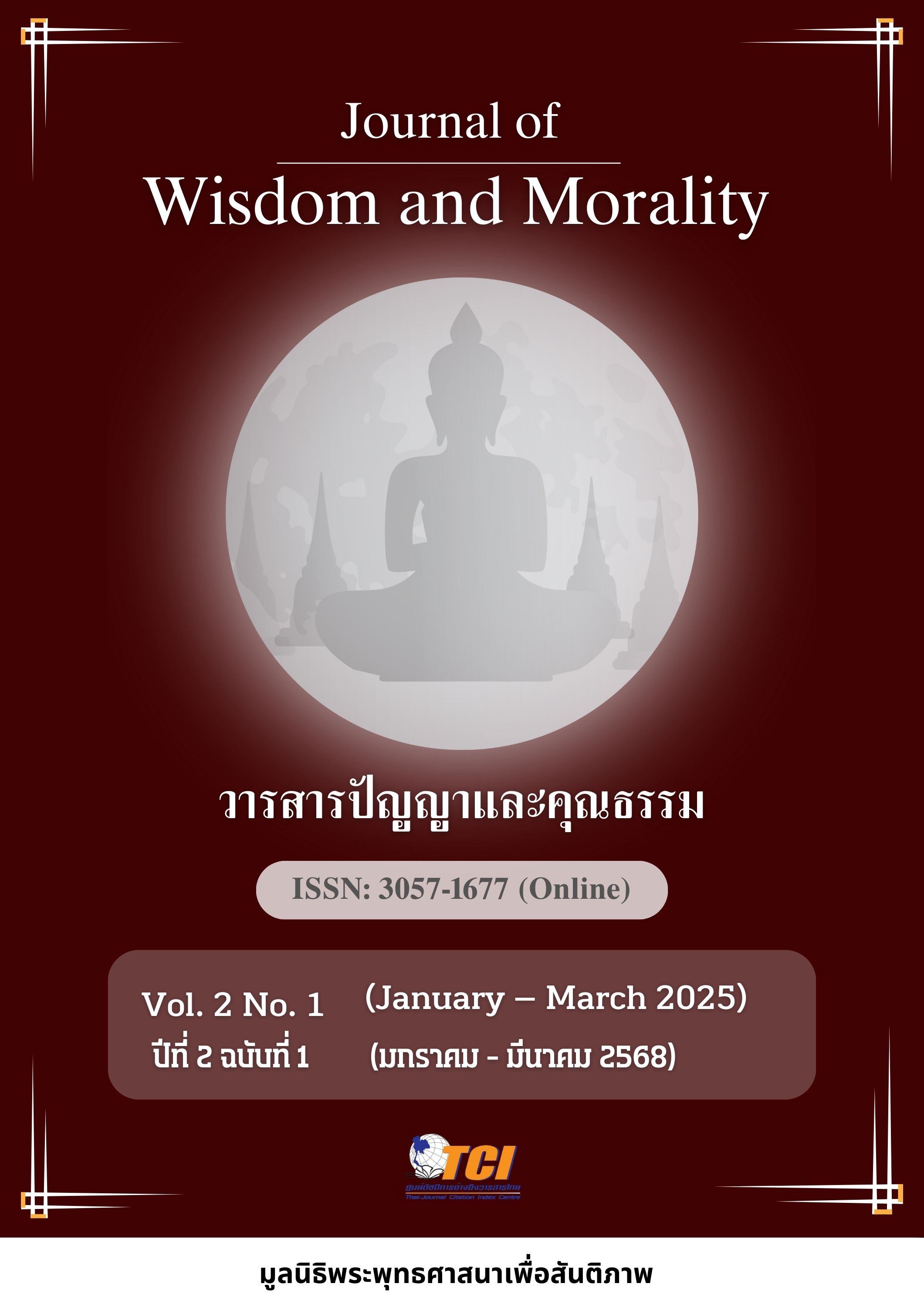The Influence of Psychological Capital on Innovative Work Behavior of Educational Personnel in the Nakhon Pathom Primary Educational Service Area Office 1
Keywords:
Ecological Influence, Innovative Work Behavior, AdministrationAbstract
The objectives of this research were to 1) study the level of ecological influence, 2) study the level of motivation in work performance, and 3) study the relationship between ecological influence and motivation in work performance. The sample group consisted of 385 educational personnel. The instrument used was a questionnaire. Data were analyzed by calculating the mean, standard deviation, and the relationship using Pearson's correlation coefficient.
The research results revealed that; 1) the overall ecological influence was at a high level. When considering individual aspects, it was found that the highest ranking was hope, followed by self-efficacy, optimism, and finally, resilience, respectively. 2) Innovative work behavior was overall at a high level. When considering individual aspects, it was found that the highest ranking was job satisfaction, followed by job effort, and lastly, job interest, respectively. 3) The relationship between psychological capital and innovative work behavior had a positive correlation both overall and in individual aspects, with statistical significance at the .01 level.
References
Carver, C.S., & Scheier, M.F. (1981). Attention and Self-Regulation: A Control Theory Approach to Human Behavior. New York: Springer-Verlag.
Chatchawan, U., Thinkhamrop, B., Kharmwan, S., Knowles, J., & Eungpinichpong, W. (2005). Effectiveness of traditional Thai massage versus Swedish massage among patients with back pain associated with myofascial trigger points. J Bodyw Mov Ther, 9(4), 298-309.
Contreras, F., Espinosa, J. C., Dornberger, U., & Acost, Y. A. (2017). Leadership and Employees’ Innovative Work Behavior: Test of a Mediation and Moderation Model. Asian Social Science, 13(9), 9-25. doi:10.5539/ass.v13n9p9
Hor, K., & Taylor, M. (2010). Suicide and Schizophrenia: A Systematic Review of Rates and Risk Factors. Journal of Psychopharmacology, 24, 81-90.
Luthans, F. (2003). Positive organizational behaviour: Implications for leadership and HR development and motivation. In L. W. Porter, G. A. Bigley, and R. M. Steers (Eds.), Motivation and work behaviour (178–195). New York: McGraw-Hill/Irwin.
Snyder, C. R., & López, S. J. (Eds.) (2007). Positive Psychology. The Scientific ad Practical Explorations of Human Strengths. New York: Oxford University.
กฤตภาส ศัตรูลี้. (2567). กลไกการเป็นตัวแปรกลางของความพึงพอใจในงาน ความน่าสนใจในงาน และความพยายามในงาน ที่มีต่อพฤติกรรมการทำงานเชิงนวัตกรรม : มุมมองของทุนทางจิตวิทยา. [หลักสูตรบริหารธุรกิจมหาบัณฑิต]. มหาวิทยาลัยศิลปากร.
ธัญญามาศ ปัญญายิ่ง. (2559). อิทธิพลของทุนทางจิตวิทยาด้านบวก คุณภาพชีวิตในการทำงาน และความผูกพันต่อองค์การที่ส่งผลต่อความตั้งใจลาออกจากงาน ของพนักงานกลุ่มธุรกิจให้คำปรึกษา. [ปริญญาโท สาขาจิตวิทยาอุตสาหกรรมและองค์การ คณะศิลปกรรมศาสตร์]. มหาวิทยาลัยธรรมศาสตร์.
ในตะวัน กำหอม. (2559). การวิจัยทางการศึกษา. มหาสารคาม: โรงพิมพ์ทีคอม.
พรมดง ชัยประสิทธิ. (2019). ทุนทางจิตวิทยาด้านบวกที่มีผลต่อประสิทธิภาพการปฏิบัติงานของพนักงาน บริษัท โฮม โปรดักส์ เซ็นเตอร์ จำกัด (มหาชน). วารสารวิชาการวิทยาลัยสันตพล, 5(2), 141–152.
พิรุฬห์พร เพียงพิมพ์. (2563). ปัจจัยทุนจิตวิทยาเชิงบวกที่ส่งผลต่อการหมดไฟในการทำงาน ของข้าราชการรุ่นใหม่ในสำนักการสอบสวนและนิติการ กรมการปกครอง. [หลักสูตรปริญญารัฐประศาสนศาสตรมหาบัณฑิต สาขาวิชารัฐประศาสนศาสตร์ ภาควิชารัฐประศาสนศาสตร์ คณะรัฐศาสตร์]. จุฬาลงกรณ์มหาวิทยาลัย.
มณีรัตน์ ชัยยะ. (2566). การบริหารทรัพยากรมนุษย์ภายใต้การเปลี่ยนแปลงสู่ยุคดิจิทัล (Digital HR). [หลักสูตรรัฐประศาสนศาสตรดุษฎีบัณฑิต วิทยาลัยนวัตกรรมการจัดการ]. มหาวิทยาลัยเทคโนโลยีราชมงคลรัตนโกสินทร์.
วัชกานต์ กล่อมแก้ว. (2566). ปัจจัยที่มีอิทธิพลต่อพฤติกรรมการทำงานเชิงนวัตกรรมของประชากร กลุ่มเจเนอเรชันวายในประเทศไทย. [หลักสูตรปริญญาการจัดการมหาบัณฑิต วิทยาลัยการจัดการ]. มหาวิทยาลัยมหิดล.
Downloads
Published
How to Cite
Issue
Section
License
Copyright (c) 2025 Journal of Wisdom and Morality

This work is licensed under a Creative Commons Attribution-NonCommercial-NoDerivatives 4.0 International License.
ทัศนะและความคิดเห็นที่ปรากฏในบทความในวารสาร ถือเป็นความรับผิดชอบของผู้เขียนบทความนั้น และไม่ถือเป็นทัศนะและความรับผิดชอบของกองบรรณาธิการ ยินยอมว่าบทความเป็นลิขสิทธิ์ของวารสาร


